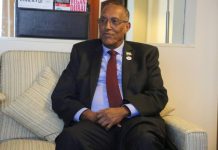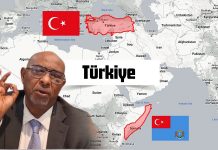INTRODUCTION
The one faintness Somaliland Foreign Affairs ministry and international cooperation in the last thirty years is that ministry did not make use of the usage of the modern digital diplomatic channels to transform the legal cases of Somaliland Recognition and also that the main obligations of the ministry of foreign affairs and international cooperation are to inform its people about its various commitments and activities in the international system with a view to gaining popular support for the realization of its foreign policy objectives., and their achievements
For instance, in our neighboring country of Somalia, the Ministry of Foreign Affairs and International Cooperation established special office online platforms and digital diplomacy channels where approximately 40 young teenagers works, which are a clear threat to Somaliland’s international relations and also they spread false misleading information about Somaliland international foreign policy
Almost every government today attaches specific importance to the role of the mass media in the conduct of its foreign policy. The complexities of international politics characterized, in recent decades, by the multiplication of actors in the international system have automatically led to an increasing role of information in international relations
In 1960, Somaliland gained its independence from the United Kingdom and become an independent state, but the parliament voted to join former Italian-ruled Somalia. In 1961, a national referendum was held wherein a majority of northerners (of present-day Somaliland) voted against unification, but a majority of Southerners voted in favor. Northern army officers would subsequently launch a rebellion to gain Somaliland’s independence which was quickly quelled. Tensions continued to simmer between North and South. In 1969, SiyadBarre, a major general of the gendarmerie, came to power through a coup and overthrew the Somali Republic. As Somalia turned into a Marxist autocracy, Barre’s would prove heavy-handed, especially towards the north.
In the early 1980s, a group of exiles from Northern Somalia, primarily members of the more prominent Isaaq clan formed the Somali National Movement to oppose the Barre regime, after a long war they culminated with the overthrow of the Barri government in 1991. Somaliland proclaimed its independence that same year. Three decades later, Somaliland has yet to gain international recognition. Still, it has the trappings of a Weberian state, including a bureaucracy, an army, a currency, and perhaps most improbably, an electoral democracy. As one study published in the Review of African Political Economy put it, “Somaliland has all of the attributes of a state, with a constitution, a functional parliament and government ministries, an army, a police force, and judiciary, and all of the symbols of statehood, such as a flag, its own currency, passports, and vehicle license plates, its own parliament but most of all, Somaliland Has a strong legal case, having been briefly independent in its current borders following the end of the British protectorate in 1960, before its ill-fated union with the former Italian colony of Somalia five days later.
However, the de facto sovereign state still needs official international recognition to get access to international financial institutions, such as the World Bank and the IMF. Private investors are also jittery about the lack of legal safeguards in a conflict-prone region.
Since 2002, Somaliland has held six popular elections, making it one of the most successful democracies in Africa
Despite all these remarkable achievements in its post-colonial state reconstruction, Somaliland’s bid for international recognition has thus far failed.
During those years, millions of dollars had been spent, offices were opened in foreign countries and Somaliland had taken its lobby for international recognition at inter-governmental organizations including African Union (AU), United Nations, Arab League, and the Intergovernmental Authority on Development (IGAD).
Successive Somaliland governments have, to the extent of their power, invested in the constitution, and tirelessly advocated for Somaliland’s unique case and achievements. However, none of these have succeeded in putting Somaliland on the world stage by gaining what it has been looking for: international recognition
Foreign relations of the Republic of Somaliland are the responsibility of the Minister of Foreign Affairs and International Cooperation.
15 ministers took the office as the Minister of Foreign Affairs and International Cooperation until the Republic of Somaliland declared its independence from Somalia on 18 May 1991, And all of them they have failed to sell to the world the achievements and activities of Somaliland gained and also gaining popular support for the realization of its foreign policy objectives and legal cases of Somaliland Recognition
In 2021 the President of the Republic of Somaliland, Musa Bihi Abdi, assumed Dr. EssaKayd as the Minister of Foreign Affairs and International Cooperation.
Immediately after his nomination Dr. EssaKayd focus to build Somaliland’s international case usingdigital diplomacy in his foreign policy whilst showing the world the potential advantage that Somaliland’s strategic location holds in the Horn of Africa for business, development, and trade for landlocked countries in Africa
The De Essa took two main points that he will lead the foreign policy of Somaliland which are Engagement and. Community empowerment
During the year that Dr. Essa was in the office, he gained great achievements in Political Affairs and he facilitates all communications with foreign governments, international organizations, and agencies working in areas of Somaliland’s political interests for purposes of negotiations and policy development. He also made great significant monitoring of political developments around the world. He built political desks that are responsible for establishing, improving, and promoting bilateral, diplomatic, economic, and social relations with other countries, he reactivated the Consulates and representative offices that Somaliland had in the following countries
• Ethiopia (Addis Ababa (Consulate General)
• Djibouti(Djibouti City (Consulate General)
• Egypt (Cairo (Representative office, to open)
• Kenya (Nairobi (Representative office)
• South Sudan (Juba (Representative office)
• Tanzania (Dodoma (Representative office)
• South Africa canton (Representative office)
Americas
• Canada(Ottawa (Representative office)[
• United States (Washington, D.C. (Representative office)
Asia
• Saudi Arabia (Riyadh (Representative office)
• Taiwan (Taipei (Representative office)
• Turkey (Ankara (Consulate General)
• United Arab Emirates (Abu Dhabi (Consulate General)
• Yemen (Sanaa (Representative office
Europe
• Belgium(Brussels (Representative office)
• France(Paris (Representative office)
• Netherlands(Amsterdam (Representative office)
• Norway(Oslo (Representative office)
• Sweden(Stockholm (Representative office)
• United Kingdom(London (Representative office)
• Denmark (Liaison office)
Oceania
• Australia (Canberra (Representative office)
Somaliland offices
• Djibouti opens consulate in Hargeisa”.
• Djibouti opens a consular office in Somaliland
• Ethiopia’s New Representative to Somaliland.
• Somaliland: Turkish Consul Demurs.
• Hargeisa (British Office)”.
• Denmark åbnerkontori Somaliland”.
• Denmark opens office in Somaliland”
Consequently, on 21 July, Abiy sent a high-level delegation led by Finance Minister Ahmed Shide to Hargeisa. It was agreed that Ethiopia should resume its normal diplomatic relationship with Somaliland by sending its ambassador to Hargeisa. This new engagement of Ethiopia with Somaliland is presumably to prevent perceived Egyptian interests in Somaliland.
Somaliland-Taiwan-China diplomacy
The 1 July was a historic day for Somaliland and the Republic of China (Taiwan).
Somaliland and Taiwan have a shared historical context: both are unrepresented and unrecognized by the international community; have established democratic governance structures; face threats from Somalia and China respectively; are aligned with the Western world, and have geostrategic value for the rest of the world
In recent years, Somaliland Established close diplomatic relations such as getting the US to open a consulate or representative office in Hargeisa. Eight countries, including the United Kingdom, Ethiopia, and Turkey, have already done
Somaliland and the United States
Somaliland and the United States do not have official diplomatic relations. While Somaliland operates a representative liaison office in Washington, D.C., it does not have formal diplomatic status under the provisions of the Vienna Convention on Diplomatic Relations
During his visit to the United States of America, Dr. EssaKayd established diplomatic relations with the United States Government and passed a Bill that requires the Department of State to annually report to Congress on U.S. assistance to Somaliland. The State Department must also report to Congress on the feasibility of establishing a U.S.-Somaliland partnership, including opportunities for collaboration on regional security issues.
This was a great success. To both United States and –Somaliland this partnership act will boost the economic development & security of both countries
Gulaid Yusuf Idaan
Email: idaan54@gmail.com
Tell:00252634420801
To be continued























